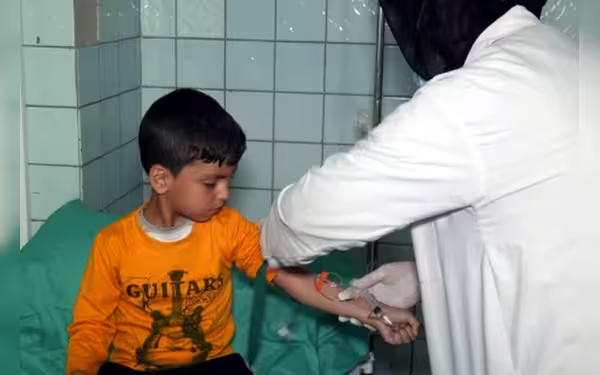Saturday, November 16, 2024 09:54 PM
Improving Hemophilia Treatment Access in Afghanistan
- Patients face emotional and financial burdens due to hemophilia.
- Shortage of Factor IX hampers treatment efforts.
- Ministry of Public Health establishes hemophilia care centers.
 Image Credits: thefrontierpost
Image Credits: thefrontierpostPatients in Afghanistan demand better access to hemophilia treatment amid ongoing challenges and shortages.
In recent years, the plight of patients suffering from hemophilia in Afghanistan has come to the forefront, highlighting the urgent need for improved access to treatment. Hemophilia is a genetic disorder that affects the blood's ability to clot, leading to excessive bleeding. For many families, this condition poses not only a medical challenge but also a significant emotional and financial burden.
Five-year-old Omar is one such child who has been battling hemophilia since he was just eight months old. His family has been making regular trips to the central blood bank for treatment over the past two years. Omar shared his experience, stating, "I got sick at eight months old, and I’ve come here for treatment." His story is echoed by other young patients like Kamran, who travels from Ghorband, a considerable distance, to receive the necessary care. Kamran expressed his gratitude, saying, "When I come to this hospital, they help me and give me blood." These personal accounts shed light on the struggles faced by families as they navigate the healthcare system in search of essential treatments.
Caregivers, such as Hayat-ur-Rahman, are also voicing their concerns. He urged both the public and medical professionals to prioritize the care of patients, emphasizing the need for a more robust support system. The officials at the central blood bank have acknowledged the challenges they face, particularly the shortage of Factor IX, a crucial component for treating hemophilia. Homayoon Hamdard, the head of the hemophilia department, stated, "Our main challenge is the shortage of factors, but we are hopeful that aid organizations will provide more assistance so we can resolve our patients’ issues." This highlights the critical role that external support plays in addressing healthcare deficiencies in the region.
On a more positive note, the Ministry of Public Health has taken steps to establish centers specifically for hemophilia patients in Kabul and other provinces. They have reported that they are supplying blood factors to patients at these centers. Sharafat Zaman Amar Khil, the spokesperson for the Ministry, mentioned, "Currently, in most regional blood banks and laboratories, we have provided the available resources for hemophilia patients. Blood factors are prepared there and administered to patients." This initiative is a step in the right direction, aiming to improve the quality of care for those affected by this condition.
As of now, the central blood bank has registered 882 hemophilia patients, a number that underscores the widespread impact of this disorder. The stories of Omar, Kamran, and many others serve as a reminder of the ongoing struggle for better healthcare access. It is crucial for the government, healthcare providers, and aid organizations to collaborate and ensure that patients receive the treatment they desperately need. Only through collective efforts can we hope to alleviate the suffering of those living with hemophilia and improve their quality of life.













